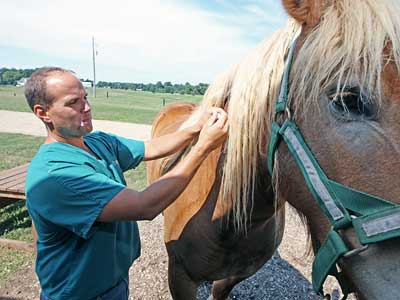
Once a primary series of 2-3 vaccine injections have been given to a horse, this is followed by boosters once or twice a year. The original series primes the immune system to recognize the foreign antigen (protein) so the body can develop an immune response to that organism if exposed. Boosters are generally given at least annually in order to remind the immune system about those foreign proteins. The immune reaction to a previously recognized antigen by a booster vaccine is referred to as an anamnestic (memory) response.
If a horse originally had a primary series, then later in life the horse’s annual vaccination lapsed beyond a couple of years, it is likely that the primary series will need to begin anew.
In all cases, it is best to follow a manufacturer’s recommendations on how often to immunize to maintain good protective levels of antibodies in the horse. It is not wise to forego routine boosters, as there is then no guarantee that the horse is protected against exposure to a disease if boosters are not given.
Checking titers to determine the need to vaccinate is inappropriate for horses. The AAEP website states: “The use of antibody titers or other immunological measurements to determine if booster vaccination is warranted is not currently practiced in the horse as standardized tests and protective levels of immunity have not been defined for most diseases. A correlation between antibody levels and protective immunity under field conditions has not yet been identified.”
Many vaccines come in a multivalent form, meaning several antigens are combined into a single injection. For example, a commonly used spring vaccine includes Eastern and Western encephalitis, tetanus, West Nile virus, influenza and herpesvirus, all in one shot.
Different manufacturers have differing rates of adverse reactions to their products. Most horses do just fine with the multivalent injections, but for those that do not, it might work best to split the injections into single antigens given in different muscles, or at different times, perhaps spaced a week or two apart. It is also possible to administer a non-steroidal anti-inflammatory drug (NSAID) at the time the immunizations are given to lessen the chance of a sensitive horse having an adverse reaction.
Keep your horse current with booster vaccines that target diseases endemic to your location. This strategy ensures your horse’s best protection against infectious diseases.


